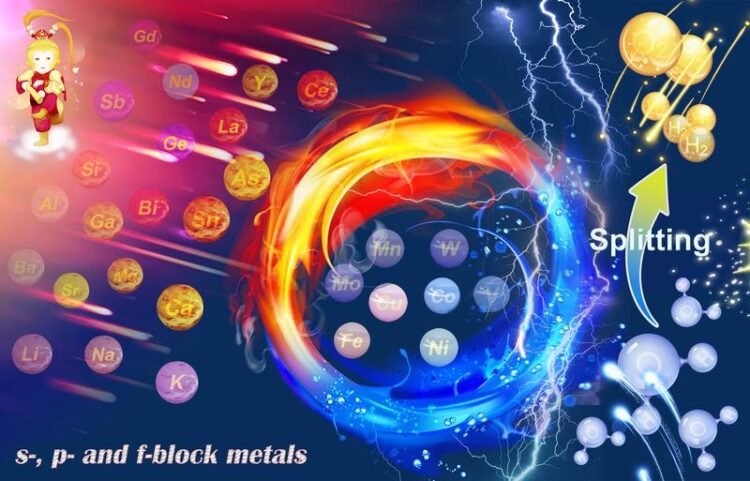Innovative catalysts: An expert review

With the help of innovative elctrocatalytic materials, water can be split up into oxygen and hydrogen. Hydrogen is a fuel storing chemical energy as long as needed
Credit: Dr. Ziliang Chen
Green hydrogen is an important component in a climate-neutral energy system. It is produced by electrolytically splitting water with wind or solar power and stores this energy in chemical form. But currently, the production of green hydrogen is not yet economical or efficient enough. The key to solving this problem is through the development of innovative electrocatalysts, which should not only work with high efficiencies but should also be available and inexpensive.
In addition to transition metals, which are already well studied for their catalytic properties, a wider choice of elements has now moved into the focus such as alkali metals, alkaline earth metals, rare earth metals, lean metals and metalloids. Some of these when combined with transition metal electrocatalysts can significantly improve performance and contribute to the development of next-generation high-performance electrocatalysts.
However, many of the processes that take place during electrocatalysis -when oxygen or hydrogen is formed – are still not understood in detail. In a review article, an international team of experts guides us through this exciting research field and draws a perspective, sketching the next steps catalyst research could take. “This contribution summarises the current state of knowledge on such unconventional s-, p-, and f-block metal-based materials and makes it comprehensible to a wider community of scientists”, Dr. Prashanth W. Menezes points out and adds: “Further, the essential role of such metals during water splitting electrocatalysis is described in great depth, as well as the modification strategy that should be considered when one wants to utilize them to mediate non-noble-based electrocatalysts. We hope to significantly accelerate research and development of novel, innovative catalyst materials with this review article.”
Note: Dr. Prashanth W. Menezes is Head of Materials Chemistry for Thin-Film Catalysis Group in the CatLab-Project at HZB and Head of Inorganic Materials Group at TU Berlin.
His twitterhandle is @EnergycatLab
CatLab: Together with the Fritz Haber Institute of the Max Planck Society, HZB is setting up the Catalysis Laboratory CatLab, which is intended to accelerate research into innovative catalysts. CatLab is supported by the German Federal Ministry of Education and Research.
https://www.helmholtz-berlin.de/projects/catlab/index_en.html
Journal: Advanced Materials DOI: 10.1002/adma.202108432 Method of Research: Systematic review Subject of Research: Not applicable Article Title: The Pivotal Role of s-, d-, and f-Block Metals in Water Electrolysis: Status Quo and Perspectives Article Publication Date: 1-Feb-2022 COI Statement: none
Media Contact
Antonia Roetger
Helmholtz-Zentrum Berlin für Materialien und Energie
antonia.roetger@helmholtz-berlin.de
Office: 0049-308-062-43733
Original Source
Media Contact
All latest news from the category: Life Sciences and Chemistry
Articles and reports from the Life Sciences and chemistry area deal with applied and basic research into modern biology, chemistry and human medicine.
Valuable information can be found on a range of life sciences fields including bacteriology, biochemistry, bionics, bioinformatics, biophysics, biotechnology, genetics, geobotany, human biology, marine biology, microbiology, molecular biology, cellular biology, zoology, bioinorganic chemistry, microchemistry and environmental chemistry.
Newest articles

Skyrmions move at record speeds
… a step towards the computing of the future. An international research team led by scientists from the CNRS1 has discovered that the magnetic nanobubbles2 known as skyrmions can be…

A flexible and efficient DC power converter for sustainable-energy microgrids
A new DC-DC power converter is superior to previous designs and paves the way for more efficient, reliable and sustainable energy storage and conversion solutions. The Kobe University development can…

Technical Trials for Easing the (Cosmological) Tension
A new study sorts through models attempting to solve one of the major challenges of contemporary cosmic science, the measurement of its expansion. Thanks to the dizzying growth of cosmic…





















